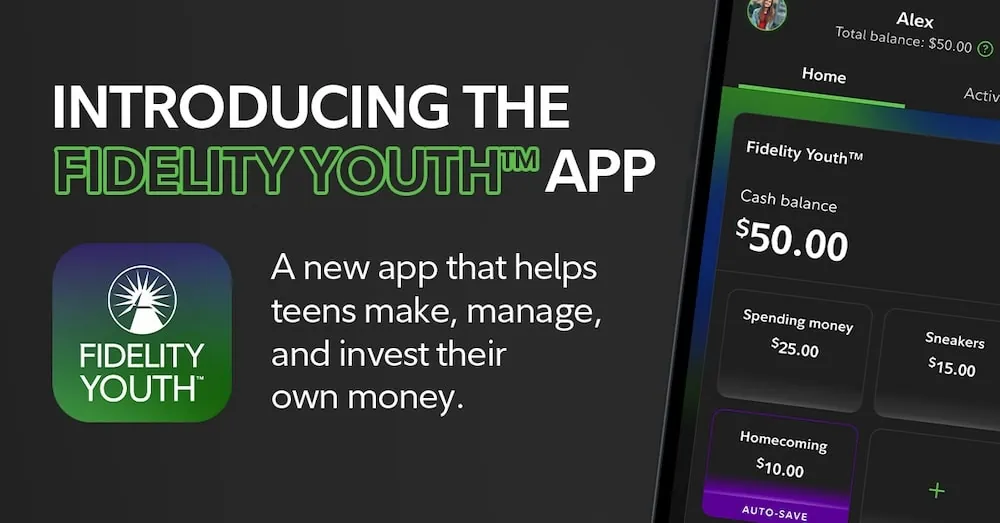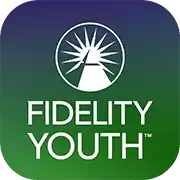Best Investing App + Money App for Teens−Top Pick
- The Fidelity Youth™ Account is a free¹ account where teens can save, spend, and invest their own money.
- No monthly fees or account minimums to open.
- Your teen can learn to save and spend smarter with their own debit card, which features no domestic ATM fees.²
- Teens can invest in stocks for as little as $1 with fractional shares.³
- Parents can set up alerts and monitor their teen's account activity online, and through statements, trade confirmations, and debit card transactions.
- The Fidelity Youth™ app will have a dedicated Youth Learn tab to help jumpstart your teen's financial learning and build better money habits.
- No monthly account fees
- Investing feature
- Fractional shares
- Parental controls
- Comprehensive financial suite for teens
- Parent must be a Fidelity account holder
- Account balance doesn't accumulate interest
- No chore or allowance system
Teenage Goal Setting Strategies to Help
Daydreaming comes naturally, but goal setting does not. A difference between goals and dreams is that goals require taking action, while dreams do not. Setting goals isn’t an inherent skill. It needs to be learned and practiced. The strategies below help teenagers practice setting achievable and worthwhile goals.
1. Focus on Quick Wins to Get Started
 Teens need to get some “quick wins” when they start setting goals. For adults and teenagers alike, sometimes a fear of failure can prevent us from working on a goal.
If you don’t try, you can’t fail, right? These easier goals give teenagers confidence they can accomplish harder ones.
For example, saving a substantial amount of money may seem daunting and unattainable. A quick win would be to sign up for a bank account for teenagers. That one step makes them closer to their goal than they were before.
Checking something off one’s to-do list that can be done in a short amount of time proves a certain level of capability.
Plus, quick goals fight against procrastination. It’s easier to convince yourself to do something that will take only a few minutes than it is to start a long-term project.
Teens need to get some “quick wins” when they start setting goals. For adults and teenagers alike, sometimes a fear of failure can prevent us from working on a goal.
If you don’t try, you can’t fail, right? These easier goals give teenagers confidence they can accomplish harder ones.
For example, saving a substantial amount of money may seem daunting and unattainable. A quick win would be to sign up for a bank account for teenagers. That one step makes them closer to their goal than they were before.
Checking something off one’s to-do list that can be done in a short amount of time proves a certain level of capability.
Plus, quick goals fight against procrastination. It’s easier to convince yourself to do something that will take only a few minutes than it is to start a long-term project.
2. They Want Freedom to Set Their Own Goals; Provide Suggestions & Structure
 You’ve seen it before. The parent who wanted to be a famous athlete or actress and decided to push that dream onto a child. It’s essential teenagers have the autonomy to create their own goals.
Parents are still valuable in providing goal suggestions as long as they don’t force them. Ask questions, such as, “Why did you choose this goal?” and “What steps do you need to take to reach this goal?” Teaching the components of what makes a strong goal is also useful.
To have the best chance at accomplishing goals, they should be Specific, Measurable, Achievable, Realistic, and Timely (SMART). Vague goals, such as “try harder in school,” aren’t as effective as specific goals, such as “turn in all my assignments on time.”
To test a goal’s measurability, consider asking, “How will you know when you’ve accomplished this goal?” Unrealistic goals, such as getting 100% on every test, can instill a sense of failure if not accomplished. Goals should be more realistic.
Finally, goals work best with a clear timeline, rather than being indefinite. If a goal never ends, you never get a sense of accomplishment from completing it.
Encourage goals to be ones inside a teenager’s control, rather than somebody else’s. For example, replace the goal “get the lead in the school play” with “have my audition monologue completely memorized.”
Once goals are established, teenagers should write them down to increase their chances of success.
You’ve seen it before. The parent who wanted to be a famous athlete or actress and decided to push that dream onto a child. It’s essential teenagers have the autonomy to create their own goals.
Parents are still valuable in providing goal suggestions as long as they don’t force them. Ask questions, such as, “Why did you choose this goal?” and “What steps do you need to take to reach this goal?” Teaching the components of what makes a strong goal is also useful.
To have the best chance at accomplishing goals, they should be Specific, Measurable, Achievable, Realistic, and Timely (SMART). Vague goals, such as “try harder in school,” aren’t as effective as specific goals, such as “turn in all my assignments on time.”
To test a goal’s measurability, consider asking, “How will you know when you’ve accomplished this goal?” Unrealistic goals, such as getting 100% on every test, can instill a sense of failure if not accomplished. Goals should be more realistic.
Finally, goals work best with a clear timeline, rather than being indefinite. If a goal never ends, you never get a sense of accomplishment from completing it.
Encourage goals to be ones inside a teenager’s control, rather than somebody else’s. For example, replace the goal “get the lead in the school play” with “have my audition monologue completely memorized.”
Once goals are established, teenagers should write them down to increase their chances of success.
3. Help Them Understand Costs & Benefits
 Teenagers need to consider possible challenges and benefits of their goals. Some goals require money. For instance, a young adult may want to attend a basketball camp over the summer to improve his or her chance of making the varsity team the following academic year.
If you’ve agreed this is a cost the teenager will be required to cover on their own, you can help them calculate how long it will take to make the money, whether from an allowance or a part-time job.
Costs aren’t all monetary. If a teenager’s goal requires waking up earlier, it may not occur to him that a potential downside may be needing to go to bed earlier and missing out on previously enjoyed late-night activities.
There may also be more benefits to certain goals than originally realized as well. While the primary goal of babysitting may be to earn more money, chasing around young children may also provide physical benefits.
A teenager considering volunteering for a cause she believes in may not realize she could later ask an adult from the charity to write her a college recommendation letter.
Fully understanding the costs and benefits of goals will help teens determine if a goal is worth it, and if so, how to prepare for it.
Teenagers need to consider possible challenges and benefits of their goals. Some goals require money. For instance, a young adult may want to attend a basketball camp over the summer to improve his or her chance of making the varsity team the following academic year.
If you’ve agreed this is a cost the teenager will be required to cover on their own, you can help them calculate how long it will take to make the money, whether from an allowance or a part-time job.
Costs aren’t all monetary. If a teenager’s goal requires waking up earlier, it may not occur to him that a potential downside may be needing to go to bed earlier and missing out on previously enjoyed late-night activities.
There may also be more benefits to certain goals than originally realized as well. While the primary goal of babysitting may be to earn more money, chasing around young children may also provide physical benefits.
A teenager considering volunteering for a cause she believes in may not realize she could later ask an adult from the charity to write her a college recommendation letter.
Fully understanding the costs and benefits of goals will help teens determine if a goal is worth it, and if so, how to prepare for it.
Example Goals for Teenagers
 Many teenagers’ goals fall under the categories of financial, academic, and more general “life goals.” Always having a few goals from each category keeps teens motivated and well-rounded.
Many teenagers’ goals fall under the categories of financial, academic, and more general “life goals.” Always having a few goals from each category keeps teens motivated and well-rounded.
→ Teen Money Goals
Many people start their first jobs as teenagers. It’s fun to use disposable income as soon as it hits a bank account, but it’s better to use some of the money towards both short-term and long-term goals. Popular short-term money goals for teenagers may include:- Get hired for a first job
- Earn enough to buy a prom dress, new electronic, etc.
- Earn money from a side hustle
- Set up a savings account this month
- Open an investment account this month
- Track your stocks and investments
- Download a financial app to track spending
- Apply to one new scholarship this week
Start Investing With a Fidelity Youth™ Account

- Available: Sign up here
- Price: No account fees¹, no account minimum, no trading commissions*
- Platforms: Web, mobile app (Apple iOS, Android)
Controls parents want and need
A parent or guardian must have or open a brokerage account with Fidelity® to open a Fidelity Youth Account. For new Fidelity® customers, opening an account is easy, and there are no minimums and no account fees. Having a Fidelity account gives parents and guardians access to plenty of tools they can use to monitor their teen’s activity: They have online account access, can follow monthly statements and trade confirmations, and can view debit card transactions made in the account. To make it even easier, you can set up alerts to notify you of your teen’s trades, transactions, and cash management activity, keeping you firmly in the loop on actions your teen takes across the Fidelity Youth Account’s suite of products. If your teen has an interest in learning about investing, becoming smarter about money, and taking their first steps toward building their financial journey, you should consider downloading the Fidelity Youth app and opening a Fidelity Youth Account. The account comes custom-built for their needs, which will help them become financially independent and start investing for their future. Read more in our Fidelity Youth Account review.- The Fidelity Youth™ Account is a free¹ account where teens can save, spend, and invest their own money.
- No monthly fees or account minimums to open.
- Your teen can learn to save and spend smarter with their own debit card, which features no domestic ATM fees.²
- Teens can invest in stocks for as little as $1 with fractional shares.³
- Parents can set up alerts and monitor their teen's account activity online, and through statements, trade confirmations, and debit card transactions.
- The Fidelity Youth™ app will have a dedicated Youth Learn tab to help jumpstart your teen's financial learning and build better money habits.
- No monthly account fees
- Investing feature
- Fractional shares
- Parental controls
- Comprehensive financial suite for teens
- Parent must be a Fidelity account holder
- Account balance doesn't accumulate interest
- No chore or allowance system
→ Teen Life Goals
Life goals for teenagers will vary broadly based on their current interests. Some examples of these life goals may include:- Getting a driver’s license
- Traveling abroad
- Trying a new sport
- Acting in a play
- Learning to cook a favorite dish
- Keeping a journal
- Writing a novel
→ Teen Academic Goals
Academics are a significant part of a teenager’s life in high school and it continues to be so for those who attend college or a trade school. There are many beneficial academic goals teens may make, such as:- Making honor roll
- Graduating high school
- Visiting college campuses
- Applying for financial aid
- Getting accepted into college
- Earning a scholarship
- Securing an internship
- Until the end of the year (short-term commitment)
- Through elementary school (medium-term commitment)
- For the rest of your life (long-term commitment)
Final Thoughts
Setting and accomplishing goals is extremely beneficial for teenagers. Setting your own goals is a way of taking command of your life and learning about yourself in the process. If not every goal is completed, or not completed within the original timeframe, that’s ok. Goals can be adjusted. Sometimes the act of working towards a goal is more important than accomplishing the goal itself. Related:
- Best Debit Cards for Teens
- Best Kid Debit Cards
- Best Prepaid Debit Cards for Kids and Teens
- Best Credit Cards for Kids
- Best Credit Cards for Teenagers
Terms and Conditions for Fidelity Youth™ Account The Fidelity Youth Account can only be opened by a parent/guardian. Account eligibility limited to teens aged 13-17. * $0.00 commission applies to online U.S. equity trades and Exchange-Traded Funds (ETFs) in a Fidelity retail account only for Fidelity Brokerage Services LLC retail clients. Sell orders are subject to an activity assessment fee (from $0.01 to $0.03 per $1,000 of principal). Other exclusions and conditions may apply. See Fidelity.com/commissions for details. Employee equity compensation transactions and accounts managed by advisors or intermediaries through Fidelity Clearing & Custody Solutions® are subject to different commission schedules. ¹ Zero account minimums and zero account fees apply to retail brokerage accounts only. Expenses charged by investments (e.g., funds, managed accounts, and certain HSAs) and commissions, interest charges, or other expenses for transactions may still apply. See Fidelity.com/commissions for further details. ² Your Youth Account will automatically be reimbursed for all ATM fees charged by other institutions while using the Fidelity® Debit Card at any ATM displaying the Visa®, Plus®, or Star® logos. The reimbursement will be credited to the account the same day the ATM fee is debited. Please note, for foreign transactions, there may be a 1% fee included in the amount charged to your account. The Fidelity® Debit Card is issued by PNC Bank, N.A, and the debit card program is administered by BNY Mellon Investment Servicing Trust Company. These entities are not affiliated with each other, and Fidelity is not affiliated with PNC Bank or BNY Mellon. Visa is a registered trademark of Visa International Service Association, and is used by PNC Bank pursuant to a license from Visa U.S.A. Inc. ³ Fractional shares quantities can be entered out to 3 decimal places (.001) as long as the value of the order is at least $0.01. Dollar-based trades can be entered out to 2 decimal places (e.g. $250.00) Fidelity Brokerage Services LLC, Member NYSE, SIPC 900 Salem Street, Smithfield, RI 02917






